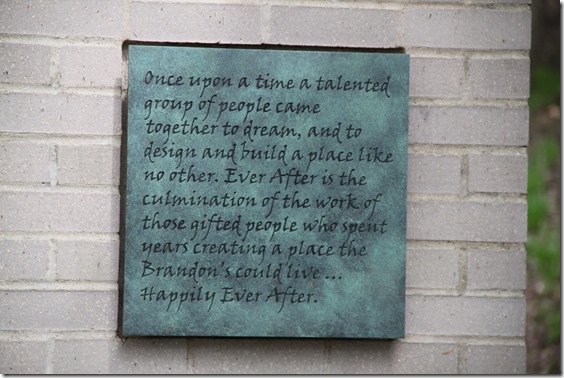The Question:
Now that we have all read it, what for you was the most jaw-dropping moment of Brandon's Lasting Lessons?
The Warning:
We're going to spoiler this. If you haven't read it yet you should go do that.
The Responses:
Brian: There are many jaw-dropping things. The whole book is cause to walk around Ann Arbor drooling, from Lochdogg's inability to parse data to Brandon cutting down the nets to all of the infinite firings. But I was most stunned by this:
Also the ellipsis.
That's the welcome plaque outside Brandon's house. It is quite something, and then you get to "the Brandon's." WHO DOESN'T CHECK A PLAQUE THAT IS GOING ON THEIR HOUSE CALLED "HAPPILY EVER AFTER"?! Even leaving aside the crazy rich person vibe the whole thing gives off, this is one metal object that Brandon clearly intends for generations to come and marvel at, and it isn't even proofread. Says somethin' about somethin', that.
--------------------------------
Seth: It has to be "Firing Fridays," and the massive turnover inside the athletic department. Throw a football down Granger and chances are it will be caught by someone sitting on the porch of a modest home with an "M" flag. That person probably had many opportunities through the years to take a job somewhere else that would afford a far larger and newer home, probably with a big yard and PVC pipes. So many of these people were pushed out, scared off, or straight-up let go that I even know a few of them.
In some cases, e.g. football coach, directing a money cannon at a proven professional is warranted. But Brandon took this to an extreme, bringing in two six-figure outsiders to replace every longtime $45k family member, then firing the family on the flimsiest of pretenses—often just voicing disagreement with Brandon—at such a rate that "Firing Fridays" was a thing. In a few short years those remnants from the Canham-Schembechler-Martin department were surrounded by a certain archetype of in-it-for-the-money young professional who knows nobody in town, owes everything to Dave Brandon, and knows little about college athletics except not to disagree with the boss.
Reading the quotes from former marketing and event presentation director Ryan Duey was the point when I got so angry at Brandon that even after getting up and stomping around the house for 20 minutes I had to get up and stomp around again like one sentence later. My page 297 is smudged and stained and has water wrinkles because it took me a day and multiple rooms to get through without throwing a tantrum in front of the kid.
The damage from that is irreparable. The people Brandon brought in are hardly worthless—they earned that payday by being excellent at what they do—but it will take 30 or 50 years for the kind of community and institutional knowledge Michigan used to have to grow back. Even talking about it now—three times in writing this response I've had to put down the keyboard and take a stomping tour around the living room. In fact here comes the fourth.
--------------------------------
[After the jump: you may want to make sure there's nothing throwable in reach]
David Nasternak: I have to admit that I'm only just over half way through BLL, currently. Shockingly, the progression of football season has severely cut into my free time for things like...reading.
The most gut-wrenching theme that unfortunately has repeated itself throughout the chapters I've read so far is Brandon's seeming ease with which he either fired people (with not much valid reasoning) or threw them under the bus, concerning whatever specific situation. Previously, I'd heard stories regarding that happening to a handful of employees, but I never realized how commonplace and widespread it actually was.
Reading that over and over just gave me a sick-to-my-stomach feel that I almost had to take a break a few different times. Now, I understand that people do get fired and upgrades happen in business -especially in the sports industry; however, the rate at which it happened and certain coaching positions that it happened to were downright baffling. Additionally, someone who can just cut ties with that amount of people -many of whom had quite a dedicated loyalty to Michigan that went above and beyond a paycheck- just for disagreeing or questioning some of the other changes/processes really makes me angry. Money and success are important; however, so are character and integrity...and those are qualities that money or success will never be able to grant. As the book goes along, I'm noticing that Brandon generally valued himself over others and would not hesitate to remove people if they became a hindrance to his agenda or publicly blame them in order to save himself from ridicule. I just believe there is no tolerance for behavior like that, especially in a leader.
--------------------------------
Adam Schnepp: The most jaw-dropping moment for me came during Brandon's meeting with four University leaders on Wednesday, October 29, 2014. As Bacon relays it, everyone in that meeting saw a new side of Brandon; he listened, he took responsibility for mistakes, and he seemed to genuinely want to know what could be done to mend some of the fences he'd broken. After reading a detailed chronological history of burned bridges and unimaginable arrogance, this new version of Brandon was hard for me to believe. The first few pages of this account painted Brandon as sincere, and that's a word that could only be used to describe his adherence to his own ideas and methods in the face of logic to that point.
![51OXJPqGd-L._SX327_BO1,204,203,200_[1] 51OXJPqGd-L._SX327_BO1,204,203,200_[1]](http://mgoblog.com/sites/mgoblog.com/files/images/Lets-Have-An-Endzone-User-QA_DF3D/51OXJPqGd-L._SX327_BO1204203200_1.jpg) |
| Warning: revelations in this book may turn your mind to goo. |
As the meeting wore on, though, Brandon maintained his new, vulnerable exterior while asking in different and subtle ways for the four other people in the room to tell him he had done a good job. He was looking for personal validation and for others to essentially agree that it was outside forces conspiring against him, not his own mistakes, that had put him in a position where he was holding onto his job by a thread. Again, my jaw hit the floor. Here's Brandon acting as though he's made this sweeping change to who he is, and when it comes down to it he again showed concern for little other than his own ego. His personality was to the best of his ability, and he didn't fix it.
--------------------------------
Ace: Perhaps because my focus is mainly on the revenue sports, I never fully realized how much coaching turnover there was across the athletic department until I started doing research for the book. Putting together the numbers was jaw-dropping: only one coaching staff Brandon inherited, consisting of all of two people, remained completely intact during his tenure. Despite Brandon's meddling, Michigan's performance in the Director's Cup got worse.
On top of that, Brandon treated the coaches he inherited like dirt, to the point it became obvious in the book he planned to oust several of them all along, almost regardless of performance. Few quotes stand out like the one he delivered to the men's soccer team at the team banquet after one of the most successful seasons in school history, when they won the Big Ten title and made the NCAA Final Four: "Do you know what happens when you make it to the Final Four? We expect you to do it again." He said this to the whole team! At a celebratory banquet! Is there a stronger term for "tone-deaf"?
Coach Steve Burns, who'd been successful at Michigan for a long time, didn't get a raise or an extension, and when his team had a down year the following season—after losing 98% of their goal-scoring from the Final Four squad—he "resigned"; Brandon replaced him with Chaka Daley, who got paid a whole lot more (with a guaranteed contract, no less) for worse performance. Brandon wanted his people in the department, he went to extreme lengths to make that happen, and to top it off, his vision for the department only worked in his head.
--------------------------------
Proppe (left) and Dishell (right). Patrick Barron|when he was with the Daily
Seth: What do you mean I already went? That was Angry Seth. Also somebody had to speak for the best moment of the book.
Bacon is a journalist, and I mean that in the "he sticks to the real story and what he can prove" sense. That makes some of his writing a bit dry, since he won't deviate from the facts for the sake of drama.
But in the Proppe-Dishell story he didn't have to, because the way that unfolded was plot development so good my Creating Writing professor would be nodding along almost as approvingly as Michael Proppe's statistics teacher.
You meet Proppe and Dishell after they've won their election to a mostly useless job on a technicality. Then they take on this real job and run circles around Brandon and Loch-dogg, who are dead set on ignoring CSG and shoving this policy down the students' throats. As the story develops the heroes get more heroic, and the villains get more villainous.
Everything builds up to that meeting before the faculty when Proppe gives a drop-mic performance, then the faculty turn to Lochmann and are like "so…are you changing this policy?" and he's like "I guess we'll have to" and everybody high-fives. But guess what: Brandon welches, and by the next meeting Lochmann is right back to patronizingly telling the students to do something anatomically impossible.
If this was a Ken Follett book at that point you'd be like "okay, I shoulda seen that coming since there's still 45% of pages left in this thing and this is what Ken Follett villains do." When you're reading a Bacon book and real people are acting like every Ken Follett bad guy ever, your mind is just blown.
How did nobody bring up M-Hacks?

